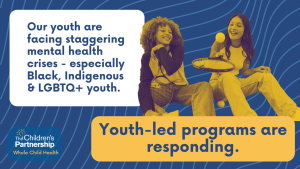“Through my own mental health experience, I became aware that it’s difficult for youth to gain mental health resources without intervention from adults. I’ve also seen some of my friends struggle with mental health, and it’s not really talked about or taught in school.” – Adria Marin; Las Fotos; member of the Hope, Health & Healing Collective youth-led policy council
The Centers for Disease Control released a report on youth mental health this month. The findings show what we’ve already known: our young people are facing mental health crises at staggering levels. Especially girls and LGBT+ youth.
Kathleen Ethier, director of CDC’s adolescent and school health division said that over the 30 years of collecting data, “[W]e’ve never seen this kind of devastating, consistent findings. There’s no question young people are telling us they are in crisis. The data really call on us to act.”
⇒ MORE: NY Times article on the CDC youth mental health findings
This data adds to the growing body of evidence that shows mental health challenges are not borne equally by all young people. In California, in addition to girls and LGBTQ+ youth, Black youth have also experienced alarming increases in suicide. Youth across the country have already been partnering to come up with solutions to the mental health crises affecting them. The Hope, Healing and Health Collective (H3 Collective), is a youth-led policy council, with support and thought partnership from adult allies within policy, research and direct service and government. The H3 Collective was formed in 2021 by The Children’s Partnership (TCP) and the National Black Women’s Justice Institute (NBWJI).
⇒ READ: H3 Collective Report with 13 youth-guided mental health policy recommendations
Samantha Giles of Black Girls Smile, and a member of the H3 Collective youth-led policy council, said during a 2022 panel, “I felt like in order to make a change, I had to join an organization that would not just say they were going to make a change, but they would actually do the work to make a change for everyone. I think really we’re just continuously asking for some sort of mental help.”
Empowering youth to lead the change they are looking for in their health and wellbeing is critical. The H3 Collective youth-policy council member Adria Marin of Las Fotos said, “I knew I needed to find ways to help my peers, and make sure that they feel supported. When I heard about the goals of the H3 Collective, and their outline of the mental health research, it really aligned with my community work. It inspired me to take part in the collective and bring the findings back to my community.”
The H3 Collective developed a policy agenda to build the capacity of youth-serving systems to provide effective and compassionate care to young people and their communities. The recommendations need legislative champions and adult allies to make them a reality for more youth facing mental health challenges.
With young people, partners and communities, TCP is working to put that agenda into action. Learn more about our new partnership with the Department of Health Care Services to administer a historic investment in youth mental health and well-being through a $10 million effort to support eight high schools as pilot sites in California for a student peer–to–peer program. This new investment in peer support was championed by exceptional youth leaders and is a direct recommendation from our own H3 Collective.
Peer support is an essential evidence-based strategy for supporting young people’s mental health. Youth from H3C shared that greater investments in peer–to–peer programs would improve the opportunities for youth of color to connect and heal with members of their own communities and identities.
Supporting young people to thrive starts with centering their experiences and leadership and we are hopeful for the work to come.
This work is ongoing! You can find data on the ongoing youth mental health crisis and how it affects Black youth in California by reading our 2023 A Child is a Child Black Children’s Health Snapshot
Check out the award-winning documentary, The Peer-To-Peer Movement: Saving Students Lives, from California Children’s Trust Youth Advisory Board member Aria Rani Sindledecker.
Getting our message out there! 1st place! Thanks @StephenPHinshaw, @CAChildrenTrust, @chacmv and @UCSFPsychiatry! Thanks for the platform C-SPAN StudentCam! https://t.co/9V8WNA9ueK
— Aria Rani Sindledecker (@ariaranis) March 16, 2022
You can also take a look at our 2023 Children’s Health Policy Agenda to see our current legislation pushing youth mental health forward.
The analysis includes 2021 data and trends from the Youth Risk Behavior Survey (YRBS), which examines health behaviors and experiences among U.S. high school students. Youth mental health has continued to worsen—with particularly stark increases in widespread reports of harmful experiences among teen girls:
- Nearly 1 in 3 (30%) seriously considered attempting suicide—up nearly 60% from a decade ago.
- 1 in 5 (18%) experienced sexual violence in the past year—up 20% since 2017, when CDC started monitoring this measure.
- More than 1 in 10 (14%) had been forced to have sex—up 27% since 2019 and the first increase since CDC began monitoring this measure.]

